Both of my parents, Samuel Dennis and Mary Burton White, were born in “York State” as New York was then called, and had moved, with their parents to Illinois, where in Knox
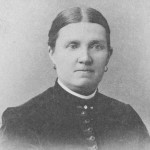 County on the 23rd of August 1842, I was born, the eldest of their children. When I was two years old they joined themselves to a very unpopular religion, The Church of Jesus Christ of Latter-day Saints. Like their Huguenot, Quaker and Puritan ancestors, they suffered much persecution because of their desire to “worship God according to the dictates of their own conscience,” a privilege granted by the Constitution of the United States, for which many of them fought and died.
County on the 23rd of August 1842, I was born, the eldest of their children. When I was two years old they joined themselves to a very unpopular religion, The Church of Jesus Christ of Latter-day Saints. Like their Huguenot, Quaker and Puritan ancestors, they suffered much persecution because of their desire to “worship God according to the dictates of their own conscience,” a privilege granted by the Constitution of the United States, for which many of them fought and died.
My earliest recollection was when my father held me up to see the faces of our beloved prophet, Joseph Smith, and his brother, Hyrum, who had been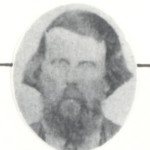 martyred in Carthage Jail.
martyred in Carthage Jail.
Mobs of armed men burned our homes, confiscated our property, heaped every indignity imaginable upon us. We were driven from county to county, from state to state and finally from the confines of civilization, this too, in the dead of winter.
My grandmother Burton, a gentle little English lady, unused to hardship soon sickened and died. As mother stood by the shallow wayside grave, she brushed away her tears and I heard her say, “Thank God, she won’t ever have to suffer cold, hunger or exposure anymore.”
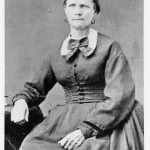 The exodus toward the west began in 1846, but Father remained behind until the Spring of 1850 assisting other families to leave. The company in which we crossed the plains was not very large. We made good time on the trip. I walked most of the way from the Missouri River to the Great Salt Lake Valley. We all walked who were able to lighten the load of the poor oxen. I was always glad when it came time to camp. The oxen soon learned without much gee-ing and haw-ing how to place the wagons to form a circle, leaving very little space between the front wheel of one and the near hind wheel of the wagon ahead.
The exodus toward the west began in 1846, but Father remained behind until the Spring of 1850 assisting other families to leave. The company in which we crossed the plains was not very large. We made good time on the trip. I walked most of the way from the Missouri River to the Great Salt Lake Valley. We all walked who were able to lighten the load of the poor oxen. I was always glad when it came time to camp. The oxen soon learned without much gee-ing and haw-ing how to place the wagons to form a circle, leaving very little space between the front wheel of one and the near hind wheel of the wagon ahead.
In the corral thus formed, the fires were made to cook the meals and the beds were made down near the wagons. If the Indians were troublesome, the cattle were put in this corral for the night and guard kept over the camp by the men.
When suppers were over, all gathered around the campfire, or if it were moonlight we needed no other light, someone would start a song, all would join in, or someone would tell an amusing story. The weary miles trudged that day would be forgotten. Soon the lively tune of a fiddle or accordion, a flute or a fife, or maybe all of them, could be heard playing a quadrille or a reel. Hardship, weariness, separation from loved ones were forgotten and these homeless exiles joined in the dance.
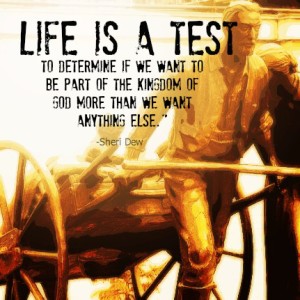 I would keep my eyes open as long as I could, picturing myself as a grown young lady, Belle of the Ball, with beautiful flowing skirts that would swish and swirl as I danced. Before I knew it my poor tired head would rest on Mother’s lap.
I would keep my eyes open as long as I could, picturing myself as a grown young lady, Belle of the Ball, with beautiful flowing skirts that would swish and swirl as I danced. Before I knew it my poor tired head would rest on Mother’s lap.
When the dancers were all tired out, or ten o’clock arrived, I would be awakened, to join in the closing hymn and kneel in prayer in a big circle before going to bed. Some of the prayers were so long that I would go to sleep again, then Father would carry me to bed.
Poor grandfather, John Griggs White, was not strong so we had to be careful of him on the trip giving him the best we had to eat. Father, Samuel Dennis White, contracted Mountain fever a week or two before we reached our destination, so Mother had to look after them and had a hard time doing that and all her other things. To me the three months journey was not a hardship.
Provisions were not plentiful any of the way. We had a cow along but she didn’t give much milk after walking all day. We ate the last of our food for breakfast in the morning of August 31, and about the middle of the afternoon we arrived at the home of Mother’s people. They had reached the Valley the year before. That date stands out in my memory as one of the happiest in my childhood. That day happened to be Mother’s thirty-second birthday, and was a joyous occasion. I couldn’t understand her tears. I said, “Mother your loved ones are here, you wanted to come, so why are you crying?” She squeezed my hand gently, and smiling through her tears answered, “Lucy Hannah, when people are as happy as I am, they can not keep from crying.”
That was the first time I knew that tears could express both joy and sorrow.
Lucy Hannah White Flake, To the Last Frontier: Autobiography
About Delisa Hargrove
I am a member of The Church of Jesus Christ of Latter-day Saints. I have moved 64 times and have not tired of experiencing this beautiful earth! I love the people, languages, histories/anthropologies, & especially religious cultures of the world. My life long passion is the study & searching out of religious symbolism, specifically related to ancient & modern temples. My husband Anthony and I love our bulldog Stig, adventures, traveling, movies, motorcycling, and time with friends and family.

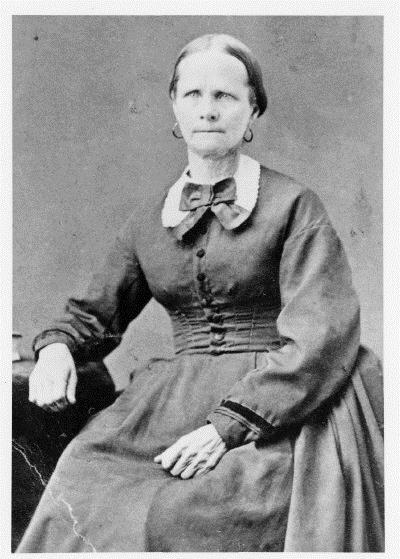
 Watch a video about the restoration of the gospel on lds.org
Watch a video about the restoration of the gospel on lds.org